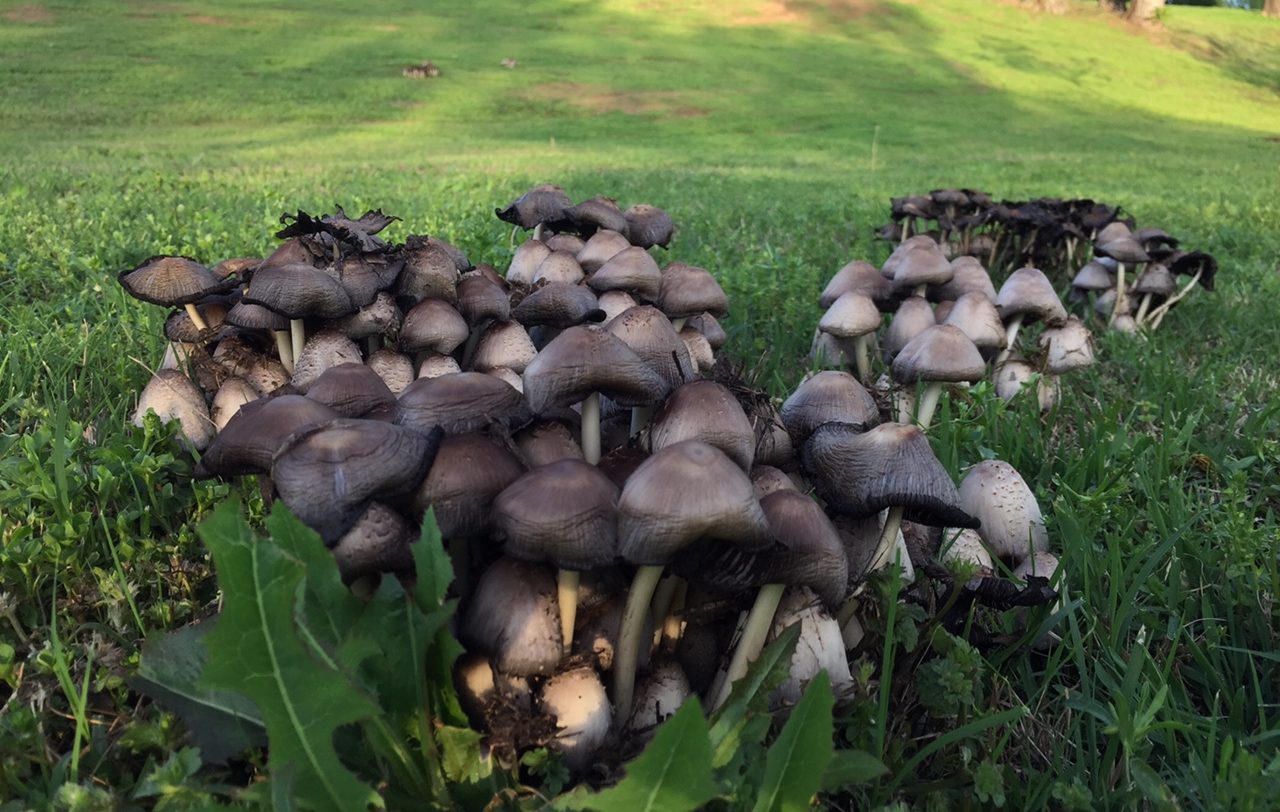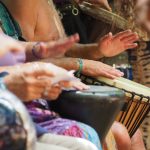I thought we could begin this morning with a piece Jan sent me from a Sunday School teacher in Ireland about how to get to Heaven:
I was testing children in my Dublin Sunday school class to see if they understood the concept of getting to heaven.
‘I asked them, ‘ If I sold my house and my car, had a big garage sale and gave all my money to the church, would that get me into heaven?
’NO!’ the children answered.
’If I cleaned the church every day, mowed the garden, and kept everything tidy, would that get me into heaven?’
Again, the answer was ‘NO!’‘If I gave sweets to all the children, and loved my husband, would that get me into heaven?’
Again, they all answered ‘NO!’
I was just bursting with pride for them. I continued, ‘Then how can I get Into heaven?’
A little boy shouted out: ‘YUV GOTTA BE F***N’ DEAD.’
I wanted to continue with the discussions we have been having about being broken open, and about finding our authentic selves. Elizabeth Lesser wrote a book called, “Broken Open: How Difficult Times Can Help Us Grow” in which she wrote:
“When there is nothing left to lose, we find the true self—the self that is whole, the self that is enough, the self that no longer looks to others for definition, or completion, or anything but companionship on the journey.”
Essentially, she is suggesting that being broken open to the point of surrender is the way to find the authentic self. In The Huffington Post, Judith Johnson wrote an article entitled, “What Does It Mean to Be Your Authentic Self.” She begins with a quote from Hamlet (Act 1, Scene 3, 78-82) so I knew it would be good:
“This above all:
To thine own self be true,
And it must follow, as the night the day,
Thou canst not then be false to any man.”
— Shakespeare
“To thine own self be true.” That is about the soundest advice you could get. But, what does it really mean? How do you know who you really are, let alone how to be true to yourself?
Let’s look first at the “Who am I?” question. Like peeling the layers of an artichoke, you go through many layers before you get to the delicious heart of who you are, and it seems that each layer is more and more succulent. Most of the outer labels of our identity place us in boxes or categories relative to other people. We might identify ourselves by race, gender, religion, political views, occupation, and so on. Many of those labels were given to us by birth or circumstance and all of them inform our point of view. But none of them are who we are — they are simply categories of relative identification and the preferences of our egos.
The more we live on the surface of our identity, the less we are in touch with our deeper self. We live in a world of “reality” television and the endless bombardment of media impressions that seek to influence our thoughts and behaviors. They give the impression that we are nothing more than superficial, selfish, judgmental and greedy individuals competing for center stage on the top of the heap. It’s a sad social commentary, but thankfully not much help in getting to know our true selves. The problem is that the more we look outside of ourselves to create a sense of self, the farther off track we go. How can we know who we truly are when we spend our time and attention trying to be something other than what we find ourselves to be? No amount of changing ourselves for the purpose of being perceived as cool or fashionable or getting the approval of others is going to bring us any closer to really knowing ourselves.
For most of my life I have been exploring the profound questions of human existence: Who am I? What is the purpose of human existence? And, of course, the God question. The answers I have gathered so far are my answers and do not necessarily ring true for others. One of life’s greatest ironies is that when it comes to esoteric and spiritual matters, “knowing” is a personal experience — not an absolute. What I “know” to be true, I know inside myself and can provide no proof to another who does not resonate with the same truth.
For each of us, our truest life purpose becomes seeking answers to the deep questions of life and then living in accordance with what we find to be true. Like turning on an inner light, it is as though we have to awaken something inside ourselves. Once we have done that, our inner knowing seems to have a voice that, if we listen to it, guides us in our daily choices. This is not the voice of personal opinions, judgments and preferences.”
In The Seeker’s Guide, Elizabeth Lessors asks us to ask ourselves, “Whose voice is it?” and to keep asking until we identify the source and when we absorbed, assimilated, or were coerced by the voice. She described her own journey and the pain of realizing that she had been living her life instructed by the condemning voices of her mother and father.
Johnson goes on, “[the voice] comes from a deeper place than that, and with practice and time we can learn to tell the difference between the voice of our ego and the voice of our authentic self. For me, it took a lot of time and experimentation to distinguish between these two voices. Now, the difference is very clear to me. The challenge is in choosing to listen to my true self rather than to my ego when they don’t agree.
Now, I know that I am being authentic when I am making a choice that creates a resonance of affirmation inside of me. Alternatively, I have learned to recognize the lack of resonance as well — even for simple things. For example, the other day a friend enthusiastically proposed we go shopping at the nearby outlet stores. Her invitation went clunk inside of me, so I declined and suggested something else that passed my inner test of resonance. Ultimately, we were unable to find something that worked for us both and chose not to get together at all. I’ve learned that if we had tried to force it, at least one of us would probably have been out of sorts. When I listen to my inner feedback system, I find my life is easier, more graceful and I am more peaceful inside. When I fight against it or ignore it is when I get into trouble and find myself disconnected from what I am doing or who I am with and I become irritable inside. It’s like having an internal GPS that tells me where my truth is.
Living from a place of profound authenticity involves being rooted in your deepest beliefs, values and truth and living a life that is a true reflection of them. It is about being true to yourself through your thoughts, words and actions. It means being willing to sacrifice any relationship, situation or circumstance that violates your truth. For example, if you are in a job or relationship that requires you to function in a way that is not in accord with your truth, you leave it. Does this mean you will live a charmed life? No, you will still have your share of sorrows as well as sweetness in your life. However, you will have the wisdom of knowing who you are to guide you. The more you practice listening to your inner wisdom, the less friction and discord you will find yourself creating in your life.
Will you ever be perfect at honoring your own truth? No, but you can strive for excellence. It’s largely a matter of where you place your focus. By holding the intention of being true to yourself, you focus your attention on whatever resonates with your truth. It becomes a self-editing process where you do more and more of those things that express your truth and less and less of those that do not. Through a clear intention and paying attention, you learn to hold yourself accountable. Through discipline and commitment, you learn to do your best to live according to who you know yourself to be. That’s profound authenticity, and it sure beats the alternative!”
I would like to finish with another quote by Elizabeth Lessor from Broken Open. She quotes Rumi’s poem:
Drum sounds rise on the air,
and with them, my heart
A voice inside the beat says,
“I know you’re tired
but come
This is the way.
And then she writes:
“May you listen to the voice within the beat even when you are tired. When you feel yourself breaking down, may you break open instead. May every experience in life be a door that opens your heart, expands your understanding, and leads you to freedom. If you are weary, may you be aroused by passion and purpose. If you are blameful and bitter, may you be sweetened by hope and humor. If you are frightened, may you be emboldened by a big consciousness far wiser than your fear. If you are lonely, may you find love, may you find friendship. If you are lost, may you understand that we are all lost, and still we are guided—by Strange Angels and Sleeping Giants, by our better and kinder natures, by the vibrant voice within the beat. May you follow that voice, for This is the way—the hero’s journey, the life worth living, the reason we are here.”


